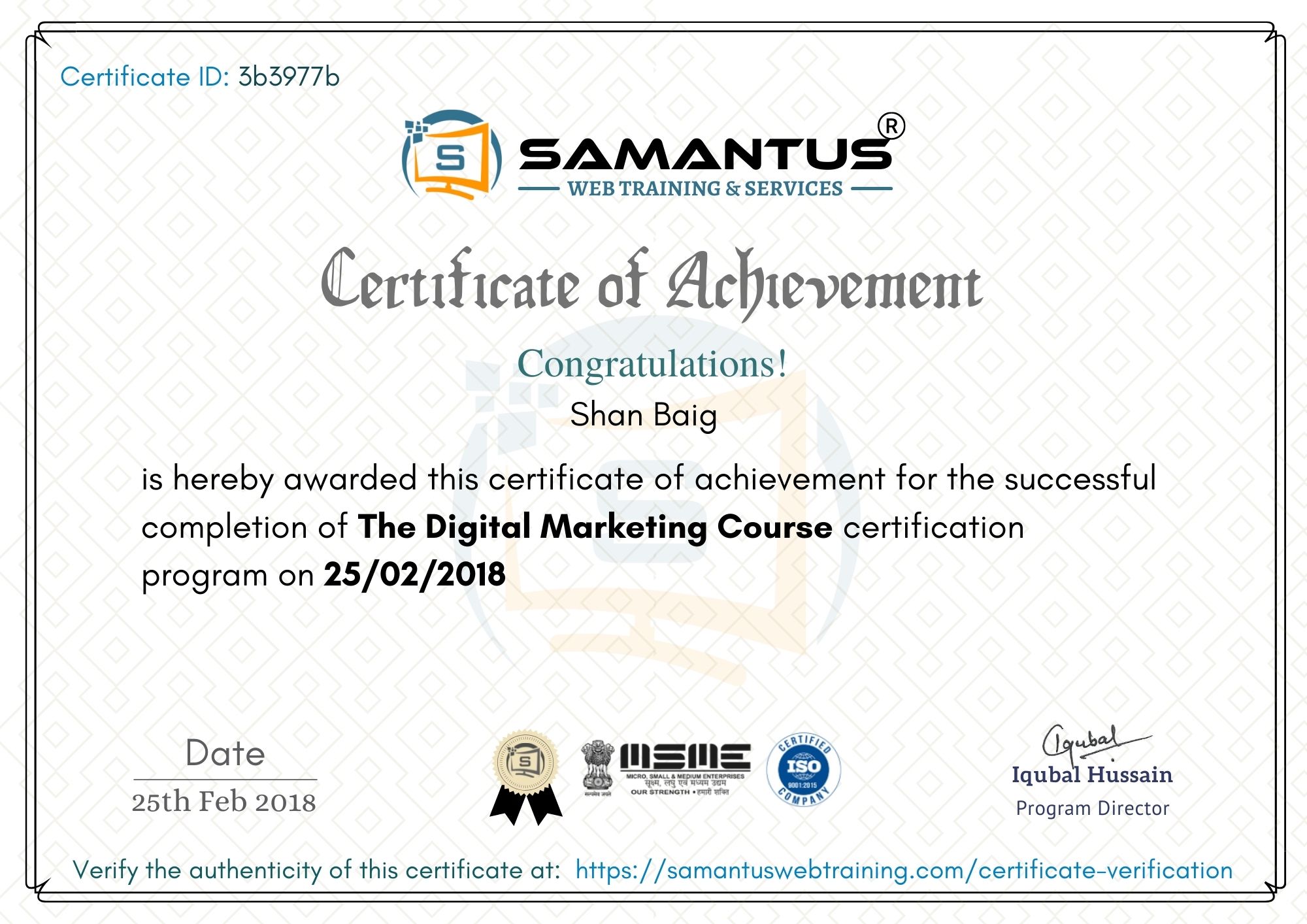A Complete Guide to
Content Marketing
Course in kerala
A Whole Guide to Content Marketing Course: Learn skills that are in demand and become equipped for work in Kerala.

What you'll learn
Whats Material Includes?
- Content Marketing Fundamentals
- Content Strategy and Planning
- Creating Compelling Content
- Content Distribution and Promotion
- Content Measurement and Analytics
- Advanced Content Marketing Techniques
- Additional Materials:
- Tools

Complete a Content Marketing Course with Samantus
- Live Project
- 95% Practical
- 100% Placement help

Get a Certificate in Content Marketing Course in kerala
Unlock Your Potential: Get Your Content Marketing Course Certificate Today

Award winning

Make your Career
Course Curriculum (Basic to Advanced):
1: Content Marketing Fundamentals
Module 1: Introduction to Content Marketing
- Understanding the Concept of Content Marketing
- The Importance of Content Marketing in Modern Marketing Strategies
- This is an overview of content marketing within the Marketing Mix.
Module 2: Setting SMART Goals for Content Marketing
- Defining SMART Goals and Objectives
- Aligning content goals with business objectives
- Creating Measurable and Time-Bound Content Targets
Module 3: Audience Identification and Content Needs Analysis
- Identifying target audience segments
- Conducting audience research and analysis
- Understanding audience content preferences and pain points
Module 4: Content Creation and Format Selection
- I am exploring various content formats such as blogs, videos, infographics, and podcasts.
- Choosing the Right Content Formats for the Target Audience and Objectives
- Crafting compelling content that resonates with the audience’s needs
Module 5: Content Distribution Channels and Strategies
- Overview of Content Distribution Channels: Social Media, Email, Website, etc.
- Developing effective content distribution strategies
- Leveraging cross-channel promotion to maximize reach and engagement
Module 6: Search Engine Optimization (SEO) for Content
- Introduction to SEO Principles and Best Practices
- Optimizing Content for Search Engines: Keywords, Meta Tags, etc.
- SEO improves content discoverability and organic traffic.
Module 7: Content Performance Measurement and Analysis
- Identifying Key Performance Indicators (KPIs) for Content Marketing
- Utilizing Analytics Tools to Measure Content Effectiveness
- Iterative optimization based on data-driven insights
Module 8: Emerging Trends and Best Practices in Content Marketing
- Staying updated on industry trends and innovations
- Incorporating emerging technologies into content strategies
- Continuous learning and adaptation are essential to maintaining competitiveness.
Module 9: Case Studies and Practical Exercises
- Analyzing real-world content marketing campaigns
- Developing and implementing content strategies for different scenarios
- Learning from Successes and Failures in Content Marketing
2: Content Strategy and Planning
Module 1: Introduction to Content Planning
- Understanding the importance of a content calendar in marketing strategies
- We are currently exploring the benefits of organized content scheduling.
Module 2: Defining Marketing Goals and Objectives
- Aligning the content calendar with overall marketing objectives
- Setting SMART goals for content marketing efforts
Module 3: Developing a Content Calendar
- Understanding a Content Calendar’s Components
- Establishing a Timeline for Content Creation, Publication, and Promotion
Module 4: Content Format Selection
- We are exploring different content formats such as blogs, infographics, videos, etc.
- Choosing the Right Formats Based on Audience Preferences and Marketing Goals
Module 5: Crafting Content for SEO
- An Introduction to Keyword Research and Analysis
- Incorporating keywords into content to improve search engine visibility
Module 6: Optimizing content for search engines
- Implementing SEO Best Practices in Content Creation
- Enhancing content discoverability and ranking through strategic keyword usage
Module 7: Content Promotion Strategies
- Developing Promotional Plans for Different Content Formats
- Leveraging Social Media, Email Marketing, and Other Channels for Content Distribution
Module 8: Monitoring and Analytics
- We are tracking content performance metrics such as engagement, traffic, conversions, etc.
- Analyzing data to refine content strategy and improve results
Module 9: Case Studies and Best Practices
- Examining Successful Content Calendar Examples from Various Industries
- Applying Strategies to Real-World Scenarios: Learning from Case Studies
Module 10: Practical Implementation and Final Projects
- Creating a Comprehensive Content Calendar Aligned with Marketing Goals
- Implementing Strategies Developed Throughout the Course
- Presenting the final content calendar and evaluation strategy
3: Creating Compelling Content
In this module, we will delve into the art and science of crafting content that captivates and resonates with your target audience.
Lesson 1: Understanding Audience Preferences
- Analyzing Audience Demographics, Psychographics, and Behavior
- Identifying audience content preferences and pain points
Lesson 2: Crafting engaging storytelling
- Exploring the Power of Storytelling in Content Marketing
- Developing Narrative Structures for Emotional Connections with Audiences
Lesson 3: Leveraging Visual Elements
- Incorporating visuals, such as images, infographics, and videos
- Visual Storytelling Techniques for Enhancing Content Appeal and Effectiveness
Lesson 4: Writing persuasive copy
- Mastering Copywriting Techniques for Different Content Formats
- Creating Compelling Headlines, Hooks, and Calls to Action
Lesson 5: Ensuring Clarity and Consistency
- Writing clear and concise content for maximum impact
- Maintaining Brand Voice and Messaging Consistency Across Platforms
Lesson 6: Adding value through insights and solutions
- Providing actionable insights and solutions to audience problems
- Positioning Content as a Trusted Resource and Thought Leader in the Industry
Lesson 7: Incorporating User-Generated Content
- Harnessing the Power of User-Generated Content for Authenticity and Engagement
- Encourage audience participation and contribution to content creation.
Lesson 8: Tailoring Content for Different Stages of the Buyer’s Journey
- At each stage, understand the buyer’s journey and content needs.
- Creating content that guides and converts prospects into customers
Lesson 9: Testing and Iterating Content Strategies
- Implementing A/B testing and experimentation to optimize content performance
- Iterating content strategies based on data-driven insights and feedback
Lesson 10: Case Studies and Best Practices
- Analyzing Successful Content Campaigns Across Industries
- Drawing inspiration and learning from best practices to improve content creation skills
4: Content Distribution and Promotion
In this module, we will explore strategies and tactics for effectively distributing and promoting your content to reach and engage your target audience.
Lesson 1: Understanding Content Distribution Channels
- Exploring Different Content Distribution Channels, including Social Media, Email, Websites, and Third-Party Platforms
- Identifying channel preferences and opportunities based on audience behavior and content goals
Lesson 2: Developing a Distribution Plan
- Creating a Comprehensive Content Distribution Plan Aligned with Marketing Objectives and Target Audience Segments
- Establishing a Cadence and Schedule for Content Publication Across Channels
Lesson 3: Leveraging Social Media Platforms
- Optimizing content for social media platforms such as Facebook, Twitter, LinkedIn, and Instagram
- Utilizing Paid Advertising and Organic Tactics to Maximize Reach and Engagement
Lesson 4: Email Marketing Strategies
- Designing effective email campaigns to distribute content to subscribers and leads
- Personalizing email content and segmentation to increase relevance and conversion rates.
Lesson 5: Content Syndication and Partnerships
- Exploring Opportunities for Content Syndication with Third-Party Publishers and Platforms
- Building strategic partnerships to increase content reach and credibility
Lesson 6: Search Engine Marketing (SEM) for Content Promotion
- Utilizing Paid Search Advertising (PPC) to Promote Content and Drive Traffic
- Implementing keyword targeting and ad copy optimization to maximize impact
Lesson 7: Influencer Collaboration
- Collaborating with Influencers and Thought Leaders to Amplify Content Reach and Engagement
- Developing authentic partnerships to leverage influencer audiences and authority.
Lesson 8: Tools and Techniques for Content Amplification
- Exploring Content Amplification Tools and Platforms to Extend Reach and Visibility
- Implementing techniques such as content seeding and amplification networks
Lesson 9: Monitoring and Optimization
- Monitoring content distribution performance across channels
- Iteratively optimizing distribution strategies based on data insights and feedback
Lesson 10: Case Studies and Best Practices
- Analysis of Successful Content Distribution Campaigns Across Industries
- Drawing inspiration and learning from best practices to improve distribution and promotion efforts
5: Content Measurement and Analytics
In this module, we will focus on tracking and analyzing key metrics to evaluate the effectiveness of your content marketing efforts and make informed decisions to optimize your strategy.
Lesson 1: Identifying Key Performance Indicators (KPIs)
- Understanding the importance of selecting relevant KPIs for content marketing
- Defining KPIs based on Business Goals, such as Website Traffic, Leads Generated, and Conversions
Lesson 2: Implementing Analytics Tools
- Tracking and monitoring content performance using tools such as Google Analytics
- Setting up Custom Reports and Dashboards to Measure Specific Metrics
Lesson 3: Analyzing Audience Behavior
- Examining audience engagement metrics such as bounce rate, time on page, and pageviews
- Gaining insights into audience demographics, interests, and geographic location
Lesson 4: Measuring Content Effectiveness
- Assessing Content Performance Metrics, including Click-Through Rates (CTR), Conversion Rates, and Engagement Metrics
- Identifying top-performing content and areas for improvement
Lesson 5: Attribution Modeling
- Understanding Different Attribution Models for Assigning Credit to Content Touchpoints Along the Customer Journey
- Evaluating Content Marketing’s Impact on Conversions and Revenue
Lesson 6: A/B Testing and Experimentation
- Conducting A/B tests to compare content element and strategy variations
- Iteratively optimizing content based on test results and data insights
Lesson 7: ROI Calculation
- Calculating Return on Investment (ROI) for Content Marketing Initiatives
- Analyzing the Value of Content Efforts in Relation to Investment Costs
Lesson 8: Data-Driven Decision Making
- Leveraging data insights to inform content strategy decisions
- Making iterative improvements to content strategy based on data analysis
Lesson 9: Reporting and Communication
- Creating comprehensive reports to communicate content performance to stakeholders
- Presenting insights and recommendations for strategy enhancement
Lesson 10: Continuous Improvement
- Establishing a culture of continuous improvement in content marketing practices
- Learning from Data Analysis and Iterative Testing to Enhance Future Content Strategy
6: Advanced Content Marketing Techniques
In this module, we will explore advanced strategies and tactics to elevate your content marketing efforts and drive greater results.
Lesson 1: Personalization and Segmentation
- Implementing personalized content strategies based on audience segmentation
- Leveraging data and automation to deliver tailored content experiences
Lesson 2: Interactive Content Creation
- Exploring interactive content formats such as quizzes, polls, and calculators
- Increasing Audience Engagement and Interaction through Dynamic Content Experiences
Lesson 3: Content Amplification and Distribution
- Developing amplification strategies to extend content reach and visibility
- Leveraging Paid Media, Influencer Partnerships, and Syndication Channels for Content Distribution
Lesson 4: Content repurposing and recycling
- Repurposing and Recycling Existing Assets to Maximize Content ROI
- Transforming long-form content into bite-sized formats for various channels
Lesson 5: Evergreen Content Strategy
- Creating Evergreen Content That Maintains Relevance and Value Over Time
- Creating a Timeless Resource Repository to Drive Sustainable Traffic and Engagement
Lesson 6: Content Localization and Globalization
- Adapting Content for Different Geographical and Cultural Audiences
- Implementing localization strategies to ensure content resonance and effectiveness in international markets
Lesson 7: Influencer Marketing Integration
- Collaborating with influencers to increase content reach and credibility
- Developing authentic partnerships to leverage influencer audiences and authority.
Lesson 8: Advanced SEO Techniques
- Implementing advanced SEO strategies, such as schema marking and featured snippet optimization
- Enhancing Content Visibility and Ranking on Search Engine Results Pages (SERPs)
Lesson 9: Content Governance and Scalability
- Establishing content governance processes to maintain quality and consistency
- Efforts to Scale Content Production and Distribution to Meet Growing Demands
Lesson 10: Emerging Trends and Future Outlook
- Exploring Emerging Technologies and Trends Shaping the Future of Content Marketing
- Anticipating and adapting to industry shifts to stay ahead of the curve
Companies That Hire
(Freshers & Experienced Required As Per Company Norms)










